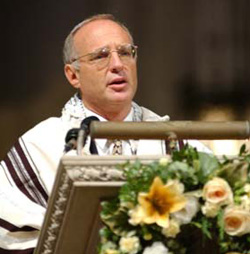NASHVILLE, Tenn.—As President Obama seeks to ramp up military action against the terrorist group known as the Islamic State or ISIS, Americans remain uneasy over the place of Islam in the United States and in the world.
More than a third—37 percent—say they are worried about Sharia law, an Islamic legal and moral code, being applied in America.
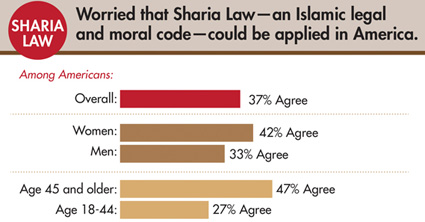 More than one-fourth —27 percent—believe the terrorist group ISIS reflects the true nature of Islam, while 43 percent believe Islam can create a peaceful society.
More than one-fourth —27 percent—believe the terrorist group ISIS reflects the true nature of Islam, while 43 percent believe Islam can create a peaceful society.
More than three-quarters of Protestant senior pastors—76 percent—say they support military action against ISIS.
Those are among the results of two surveys of 1,000 Americans each, along with a survey of 1,000 senior pastors of Protestant churches, from Nashville-based LifeWay Research.
“ISIS has stirred an odd religious debate in America today,” said Ed Stetzer, executive director of LifeWay Research. “In a nation that has long espoused religious freedom, Americans are thinking long and hard about the kind of society Islam fosters—especially the more radical groups that say they are Islamic—and whether Sharia law would ever be adopted here.”
Terror attacks and concept of Islam
A terrorist attack on a satirical magazine in Paris last month and the rise of ISIS have renewed concerns over extremist versions of Islam. ISIS fighters executed numerous prisoners over the past year, most recently a pilot from Jordan and a Japanese journalist. A young American aid worker also died recently after being kidnapped by ISIS, and the group has terrorized civilians in large swaths of Syria and northern Iraq.
Since last year, the U.S. military has helped conduct air strikes against ISIS. President Obama and other U.S. leaders have argued the group—also know as ISIL—is a terrorist organization, not a religious group.
“Now let’s make two things clear,” the president said in a Sept. 10, 2014, address to the nation. “ISIL is not Islamic. No religion condones the killing of innocents.”
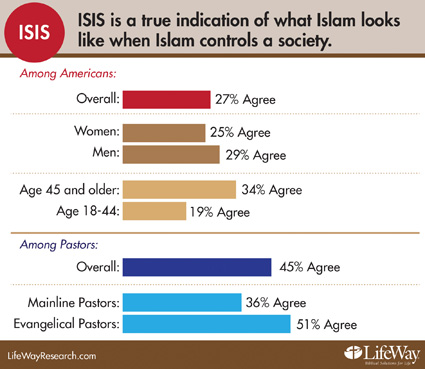 Many Americans reject that view. About half—48 percent—disagree with the statement, “ISIS is not Islamic.” More than one in five—22 percent—agree, while three in 10 are not sure.
Many Americans reject that view. About half—48 percent—disagree with the statement, “ISIS is not Islamic.” More than one in five—22 percent—agree, while three in 10 are not sure.
But few Americans believe ISIS reflects what a society shaped by Islam looks like. About a quarter—27 percent—agree with the statement, “ISIS is a true indication of what Islam looks like when Islam controls a society.” Close to half—47 percent—disagree, and 26 percent are not sure.
Pastors support military action
LifeWay Research also surveyed 1,000 Protestant senior pastors about Islam and ISIS. Researchers found widespread support for military action against ISIS.
Three-fourths of pastors—76 percent—say, “Air strikes against ISIS are needed to protect Christians in Syria and Iraq.” Only 13 percent disagree.
Support of airstrikes was similar among white (76 percent), African-American (75 percent), evangelical (79 percent) and Mainline (71 percent) pastors. Two-thirds of younger pastors—those 18 to 44—support the air strikes, as do 85 percent of pastors over 65.
Stetzer believes the overwhelming support from Protestant pastors will bolster President Obama’s case for more military action against ISIS.
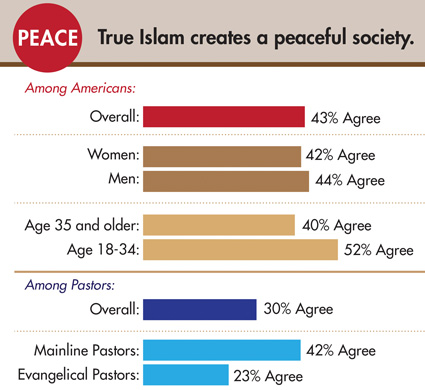 “Pastors and Americans are clearly behind greater military engagement,” he said.
“Pastors and Americans are clearly behind greater military engagement,” he said.
Pastors, researchers found, also are critical about the nature of Islam, with 61 percent of
Protestant senior pastors disagreeing with the statement, “True Islam creates a peaceful society.” Three in 10 agree. African-American pastors (50 percent) are more likely to say Islam can create a peaceful society than white pastors (30 percent).
Less than one-fourth—23 percent—of evangelical pastors agree, but that number jumps to 42 percent for Mainline pastors.
Pastors are split on whether ISIS gives a true indication of what an Islamic society looks like, with 45 percent agreeing and 47 percent disagreeing.
Evangelical and mainline pastors also are divided on this question. About half of evangelicals—51 percent—agree, but a little more than a third—36 percent—of mainliners agree.
Americans have varied views of Islam
Overall, LifeWay Research found American views about Islam are split along demographic lines, with older Americans more skeptical of Islam than younger Americans.
That’s especially true in the case of Sharia law. Overall, more than one-third—37 percent—of Americans are worried about Sharia law being applied in the United States.That includes 47 percent of those over 45. Only about a quarter—27 percent—of those 18 to 44 worry about Sharia.
Americans also are divided over how peaceful Islam is at heart, with 43 percent who agree with the statement, “True Islam creates a peaceful society.” A similar number—39 percent—disagree, and 18 percent are unsure.
More than half—52 percent—of younger Americans, age 18 to 34, say Islam can create a peaceful society. By contrast, 40 percent of those 35 and older say Islam can create a peaceful society.
Demographic differences
LifeWay Research also found other demographic differences in how Americans see Islam.
Women (42 percent) are more likely to worry about Sharia law than men (33 percent). They are also less likely (19 percent) to agree ISIS is not Islamic than men (26 percent).
While half of evangelicals—51 percent—worry about Sharia, only 34 percent of Catholics or 21 percent of Nones—those with no religious preference—share their concerns.
Evangelicals are particularly skeptical about Islam’s role in public life. Only a third agree true Islam creates a peaceful society. Catholics (49 percent) and Nones (47 percent) are more likely to see a positive role for Islam.
“Every religion has a broad spectrum of groups that fall under their umbrella,” said Stetzer. “Who is mainstream or extreme, who is orthodox or heretical is often a topic of fierce debate.”
Survey methodology
Researchers conducted phone surveys of Americans Sept. 19 to Oct. 5, 2014. The calling utilized Random Digit Dialing. Sixty percent of completes were among landlines and 40 percent among cell phones. Maximum quotas and slight weights were used for gender, region, age, ethnicity and education to reflect the population more accurately.
The completed sample for all questions is 1,000 surveys. The sample provides 95 percent confidence that the sampling error does not exceed plus or minus 3.5 percent. Margins of error are higher in sub-groups.
The phone survey of Protestant pastors was conducted Sept. 11-18, 2014. The calling list was a stratified random sample drawn from a list of all Protestant churches. Each interview was conducted with the senior pastor, minister or priest of the church called. Responses were weighted by region to reflect the population more accurately. The completed sample is 1,000 surveys. The sample provides 95 percent confidence that the sampling error does not exceed plus or minus 3.1 percent. Margins of error are higher in sub-groups.
 More than one-fourth —27 percent—believe the terrorist group ISIS reflects the true nature of Islam, while 43 percent believe Islam can create a peaceful society.
More than one-fourth —27 percent—believe the terrorist group ISIS reflects the true nature of Islam, while 43 percent believe Islam can create a peaceful society. Many Americans reject that view. About half—48 percent—disagree with the statement, “ISIS is not Islamic.” More than one in five—22 percent—agree, while three in 10 are not sure.
Many Americans reject that view. About half—48 percent—disagree with the statement, “ISIS is not Islamic.” More than one in five—22 percent—agree, while three in 10 are not sure. “Pastors and Americans are clearly behind greater military engagement,” he said.
“Pastors and Americans are clearly behind greater military engagement,” he said.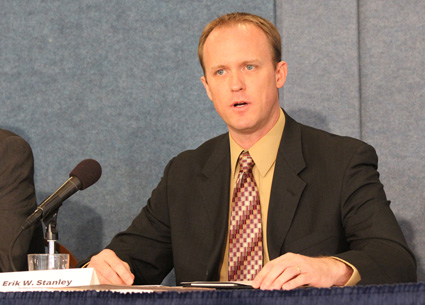

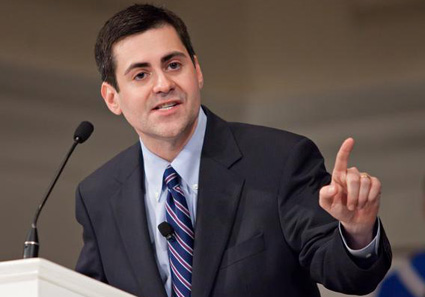
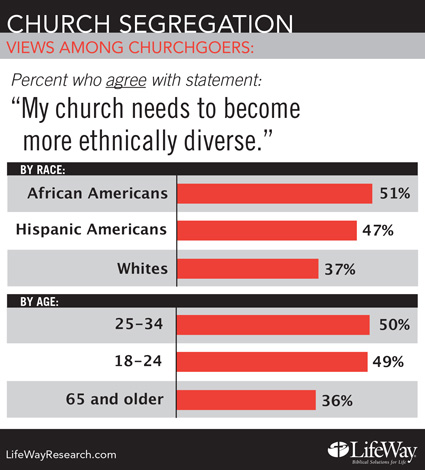 Two-thirds of American churchgoers (67 percent) say their church has done enough to become racially diverse.
Two-thirds of American churchgoers (67 percent) say their church has done enough to become racially diverse.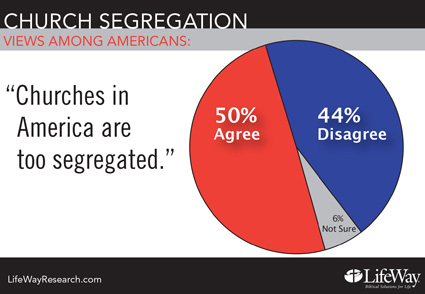 Evangelicals (71 percent) are most likely to say their church is diverse enough, while whites (37 percent) are least likely to say their church should become more diverse.
Evangelicals (71 percent) are most likely to say their church is diverse enough, while whites (37 percent) are least likely to say their church should become more diverse.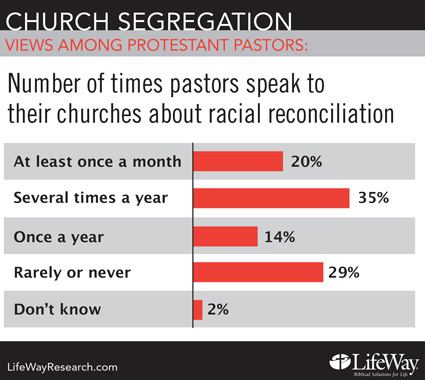 “We must face the fact that in America the church is still the most segregated major institution in America,” he said. “At 11:00 on Sunday morning when we stand and sing and Christ has no east or west, we stand at the most segregated hour in this nation. This is tragic.”
“We must face the fact that in America the church is still the most segregated major institution in America,” he said. “At 11:00 on Sunday morning when we stand and sing and Christ has no east or west, we stand at the most segregated hour in this nation. This is tragic.”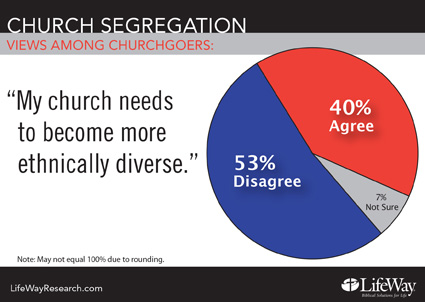 Most (84 percent) say they have spoken with a friend from a different ethnic group within the last week. Two-thirds (63 percent) say they’ve met with ministers from another ethnic group in the past month.
Most (84 percent) say they have spoken with a friend from a different ethnic group within the last week. Two-thirds (63 percent) say they’ve met with ministers from another ethnic group in the past month.



